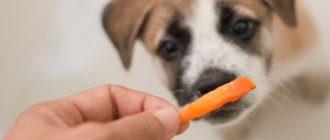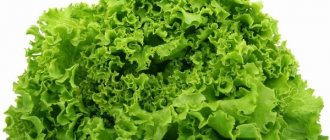How often can you give your dog eggs?
The frequency of feeding your dog eggs depends on the age and size of the animal. It is recommended to give an adult, medium-sized dog 1-2 chicken eggs per week. Quail eggs are smaller, so they can be given more often, for example, 1-2 times a week, 2 pieces at once, or one egg 2-4 times a week. Goose and duck eggs are larger than chicken eggs, so they need to be given less. Well, what can we say about the huge ostriches! One such egg can feed your dog, yourself, and even your neighbors at once!
When talking about how to properly feed a dog, I already mentioned quail eggs, which are very useful to give to male dogs about a week before the planned mating (one egg per day on an empty stomach). After all, this leads to the intensity of blood circulation in the organs of the animal responsible for procreation. Quail eggs have a richer vitamin composition than chicken eggs, and their white contains a larger amount of protein.
What eggs can you give and how often?
You can feed your pet eggs if it is on a natural diet. But, when including this product in the dog’s menu, the owner must know that it is necessary to strictly adhere to the established norm, otherwise, instead of benefit, harm can occur.
Eggs of any poultry in limited quantities are beneficial for dogs. The norm of eggs per week should be calculated based on the size and age of the animal:
- Duck and goose are the largest, so an adult dog is allowed to eat only one per week. Is it possible to give ostrich? It’s possible, but half or even a quarter will suffice.
- The dog's diet may include chicken eggs (2-3 eggs per week).
- Quail eggs are the smallest. A pet can eat 4-5 quail eggs per week.
Let's consider whether it is possible to give them to a puppy, and also how much older and pregnant individuals can eat:
- Puppies benefit from eating one chicken egg per week. You can give your baby raw egg yolk during feeding.
- It is recommended to pamper older dogs 1-2 times a week.
- Pregnant bitches - 2-3 times a week.
- Nursing mothers are given this nutritious product every other day (for speedy recovery after childbirth and lactation).
Why eggs can be dangerous for dogs
Despite the apparent benefits, eating eggs can cause adverse reactions in the body and even harm the health of the four-legged:
- In rare cases, a dog may experience individual intolerance and food allergies to this product. Symptoms will be noticeable almost immediately. Redness is observed in the area of the ears, groin and armpits, and the animal begins to itch. Therefore, one or another product must be introduced into the dog’s diet gradually, observing the body’s reaction for at least a couple of days to make sure that the body reacts normally, or that the allergy is caused by this particular product.
- With frequent feeding of eggs, increased gas formation may occur. This will be especially noticeable if the pet does not live on the street, but with you in the apartment. Any, even the most healthy product, if used incorrectly, can cause a serious illness. It's the same story with eggs. Eggs contain a sufficient amount of cholesterol, and if they are offered to your pet more often than recommended, then an excess of cholesterol in the body can cause blockage of blood vessels.
- Raw eggs can contain bacteria that can cause a serious illness such as salmonellosis. Sometimes you can hear the statement that by eating raw quail eggs it is impossible to become infected with salmonellosis, since due to the high body temperature, quails are not susceptible to this disease. But this statement is false. Quails can also suffer from pullorosis (a disease from the salmonellosis group). It is for this reason that many veterinarians do not recommend introducing raw eggs into the diet of pets, unless the animal owners are completely confident in the quality of the eggs.
But on the other hand, dogs have a short gastrointestinal tract and high acidity, as a result of which they are more resistant to salmonellosis than humans.
- You can often hear that dogs should not be given raw egg whites, as they contain a protein called avidin, which prevents the body from absorbing biotin (a B vitamin), glucose and amino acids. Lack of biotin leads to hair loss and skin inflammation. But on the other hand, raw egg white is very important for cell growth and promotes fatty acid metabolism. In fact, egg whites can only cause biotin deficiency if the dog eats large amounts of raw eggs. Moreover, egg yolk, as well as foods such as carrots and liver, more than compensate for this deficiency. It follows that animals whose diet is balanced can safely be fed raw egg whites in reasonable quantities.
- Raw eggs are not recommended for giving to sick animals with weakened immune systems, or to puppies whose immunity has not yet fully developed.
- If a dog has been eating dry food since puppyhood, then regular food (including eggs) can cause the animal to develop pancreatitis or gastrointestinal disorders.
What kind of eggs can you give?
Eggs are allowed to be included in the diet if the pet has been on natural food since birth. It is important to follow the product norm so as not to cause harm.
Which ones are possible:
- The most popular and affordable are chicken and quail eggs. They have the composition necessary for the growth and development of dogs of all breeds.
- If possible, add goose or duck eggs to the diet.
- Ostrich is quite large, it is allowed to give it 0.5 at a time.
Each type contains fats, proteins and carbohydrates necessary for the growth and development of the animal. They are given both whole and separately from the shell. Allowed to cook and add to other dishes.
Egg composition:
- calcium;
- vitamin A, E, D, PP;
- B vitamins;
- potassium;
- phosphorus;
- magnesium;
- iron.
Vitamins and microelements are necessary to maintain the health of your pet, strengthen bones and teeth. When there is a sufficient amount of them in the animal’s body, the dog’s fur becomes silky, shiny, and stops falling out.
Raw
Pet owners are wondering whether it is possible to give raw chicken eggs to their pets. Concerns relate to the risk of contracting salmonellosis.
It has been scientifically proven that dogs have short intestines and higher acidity than humans. Therefore, the likelihood of getting sick is minimal.
A raw egg can cause allergic reactions, so it should be introduced into your pet's diet carefully. Do not give the product to dogs in old age. This is due to a weak immune system.
Boiled
Boiled eggs are no less healthy than raw ones. It is a source of protein, and the yolk contains fats needed for growth and development. The body absorbs such food by 91%.
If the owner doubts the quality of a raw egg, heat treatment will help kill harmful bacteria. You shouldn't give up the product completely .
Fried
You should not feed your dog fried eggs.
They contain cholesterol that is harmful to the dog’s body. Large amounts of fat negatively affect the functioning of the intestines and pancreas. Fried chicken eggs are not digested by the body, thereby complicating the work of the liver and heart. There is a high probability of developing pancreatitis.
Is it possible to feed eggshells to your pet?
Yes, you can! In addition to the benefits of the eggs themselves, eggshells are 90% calcium, which is perfectly absorbed by the animal’s body and helps strengthen teeth, bones and joints. In addition to calcium, the shell contains about 27 useful microelements, such as fluorine, iron, phosphorus, sulfur, zinc, magnesium, which improve the condition of the pet’s skin and coat.
It is best to grind the shells and mix them with the main food. If you give a dog a whole shell, then there is a risk that when chewing, small pieces may get stuck between the teeth and in the four-legged throat.
Eggshells for dogs
It is allowed to give raw eggs with shells. The product is well absorbed by the animal’s body, saturating it with calcium.
Boiled shells, finely crushed, can be given without fear for the health of your pet. To protect the animal from salmonellosis, it is recommended to soak the egg for about 15 minutes in a weak vinegar solution.
Microelements included in the shell:
- calcium;
- fluorine;
- iron;
- sulfur;
- zinc;
- magnesium.
Microelements improve the quality of teeth and wool.
The shell is especially useful for dogs at an early age, when the bone skeleton is being formed.
In the dog's diet, the shells are ground into fine grits or flour. This allows you to avoid sharp fragments getting between your teeth when chewing.
The shell is added to ready-made dishes and soups. For quail eggs, it is quite thin and does not need to be crushed.
When introducing such a product into your pet’s diet, it is important to monitor its condition. Excess calcium is harmful to the body . It leads to osteochondrosis, disruption of the musculoskeletal system. If your dog has enough calcium in his diet, it is not recommended to feed him egg shells.
Raw or cooked
Is it possible to give your dog raw eggs? Which eggs are healthier for dogs: raw or boiled? Both raw and boiled eggs are good for dogs. This is an excellent source of protein for the body. However, studies have shown that the digestibility of boiled eggs is 91%, and raw - 50% over a 24-hour period.
Many dog owners adhere to the following rule: use the same type of food and give the pet eggs in the same form as all other food. That is, if the dog is accustomed to boiled food, then it needs to boil eggs. If the four-legged animal is fed raw meat, then the eggs are given raw, trying to take them only from trusted producers.
But, it must be said, there have never been cases of inability to digest a raw egg in combination with boiled meat and vice versa. Both raw and boiled eggs can be added to meat (both raw and boiled) and fermented milk feeding, and just give them to your pet to enjoy separately.
But you should not give fried eggs to your dog, as they contain excess fat, and their consumption can cause pancreatitis. If you really want to pamper your beloved pet, then cook him a steamed omelet.
Nutrition standards
You are allowed to feed your dog an egg once a week. The portion depends on the age and size of the dog, its immunity.
Norm for one feeding:
- Small dogs and puppies up to 3 months – 1/3 chicken, or 2 quail.
- For adult pets – 1 whole, or 4-5 quail.
- For older dogs – no more than 1 whole.
Goose and duck eggs are quite large and cannot be given whole. The norm can be measured in tablespoons: 1 egg – 3 tbsp.
How often to feed per week:
- pregnant and lactating women – 2 times;
- older dogs – 1 time;
- puppies – 1 time.
Quail is especially useful before mating, as it increases blood circulation. In this case, it is allowed to add 1 piece to the dog's food. 3-4 times a week .
It is necessary to follow the nutritional norm, ensure that the diet is balanced and varied. Overeating leads to constipation and intestinal dysfunction. It is better to add raw eggs to minced meat for cooking or to porridge during cooking.
What kind of eggs do I give to Jack?
Personally, I don’t have a farm, so Jack eats store-bought chicken or quail eggs. I alternate chicken week with quail week. Before giving Jack eggs, I wash them well with warm water. Chicken Jack gets about 1 egg per week, and quail eggs 2-3 per week. I boil chicken eggs, and give quail eggs raw. I don’t give shells from chicken eggs to Jack, but I crush shells from quail eggs and add them directly to food.
In conclusion, I would like to say the following. If you feed your pet natural food, then it is definitely possible and even necessary to give your dog eggs. But only in reasonable quantities, and if these are raw eggs, then they must be from a trusted manufacturer.”
Good luck to you! Take care of your pets!
How to give eggs
The scheme is very simple. Your dog will benefit optimally if he receives one chicken egg 1-2 times a week. Can dogs be given raw eggs? For an adult dog, of course, yes. For example, for an average German Shepherd this will be the optimal amount. If the weight is greater or less, the owner makes appropriate adjustments. Both white and yolk should be given. A raw egg is extremely contraindicated for puppies; it may be too heavy food for the gastrointestinal tract and pancreas of a small pet.
Important! Egg products are recommended only from poultry raised at home; products from industrial poultry farms can cause various allergies.
How to give eggs to a dog
You can give your dog boiled or raw eggs, but boiled eggs are easier to digest. Although raw ones are also digested perfectly. It all depends on the main food that the animal eats. The uniformity of food products is important, which means that the animal should eat either boiled or raw food. The digestive system adapts to the digestion of incoming foods; if an animal eats raw meat, then the eggs must be raw. Fried or other egg dishes should not be given to pets.
Eggs are given to the dog 1-2 times a week, without separating the yolk from the white. Raw ones are pre-washed, and hard-boiled ones are left to cool. Boiled yolk and white can be finely chopped and mixed with main food or given separately. It is recommended to give raw eggs at one feeding, mixing them with cottage cheese or low-fat kefir.
Crushed eggshells in the amount of ½ teaspoon are mixed with food.











